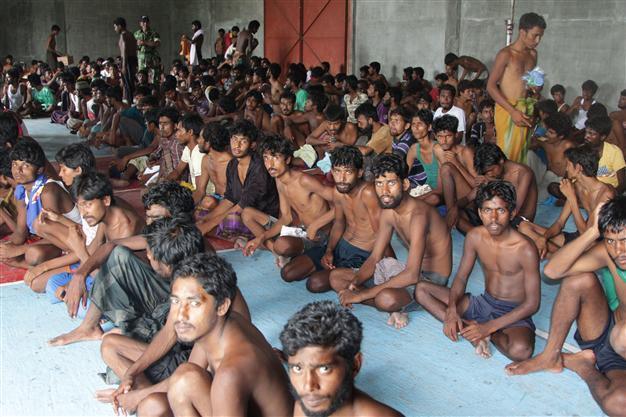Nearly 800 migrants reach land in Indonesia, others sent back to sea
BANGKOK / JAKARTA - Reuters

A group of rescued migrants mostly Rohingya from Myanmar and Bangladesh gathered on arrival at the new confinement area in the fishing town of Kuala Langsa in Aceh province on May 15, 2015. AFP Photo
Nearly 800 “boat people” were brought ashore in Indonesia on May 15 but other vessels crammed with migrants were sent back to sea despite a U.N. call to quickly rescue thousands set adrift in Southeast Asian waters.
Smugglers have abandoned ships full of migrants, many of them hungry and sick, in the Andaman Sea following a Thai crackdown on human trafficking. Thailand is the first stop on the most common trafficking route used by criminals preying on Rohingya Muslims fleeing persecution in Myanmar and Bangladeshis seeking to escape poverty.
“The latest information we have is about 794 people were found in the middle of the sea and brought ashore by fishermen at 5 a.m. on Friday morning,” Khairul Nova, a search and rescue official in Langsa, a town in the Indonesian province of Aceh, told Reuters by phone.
“They are now in a warehouse by the port as a temporary arrangement,” Nova added.
Nearly 1,400 migrants have landed in Aceh on Indonesia’s western tip, and over 1,000 have landed in Malaysia. Aceh is just across the Malacca Strait from Thailand and Malaysia.
But migrants on two other boats were turned away.
Indonesia’s navy prevented a boat with hundreds of migrants on board from entering its waters, an Indonesian military spokesman said.
A vessel carrying around 400 migrants that the Thai navy towed out to sea was heading toward Indonesia, a Thai government radio station reported.
Malaysia, too, has said it would push boats full of migrants back to sea as Malaysian people did not want to see large numbers arriving in the country.
Inter-governmental agencies called on the region’s governments to rescue the migrants first and worry about long-term solutions later.
“The situation is very grave,” said Joe Lowry, regional spokesman for the International Organization for Migration in Bangkok.
“They have no food, no water and are drinking their own urine. This is a game of maritime ping pong with human life. We expect governments in the region to find a solution rapidly... or we will be finding boatloads of desiccated corpses floating around in the Andaman Sea in coming days.”
Keep borders open
The IOM had freed up $1 million to help the region’s governments supply food, water and medicine to those found, he said.
The United Nations on May 14 urged governments to fulfil their obligation to rescue those at sea and “keep their borders and ports open in order to help the vulnerable people who are in need.”
But there has been no sign the region’s governments plan to bring those adrift to land.
The wooden boat towed back out to sea by the Thai navy was found on May 14 near the southern Thai island of Koh Lipe in the Andaman Sea with hundreds of migrants packed on the deck, including children.
Thai authorities fixed the boat’s engine and supplied those on board with food, water and medicine before towing it back out to sea in the early hours of May 15 morning, said Lieutenant Commander Veerapong Nakprasit, a naval officer based on Koh Lipe.
“Those on the boat did not want to come to Thailand so we gave them food, medicine, fuel and water,” Veerapong told Reuters.
“We did our humanitarian duty. They wanted to go to a third country. They did not want to come to Thailand so we sent them on their way. This is not a push back because these people wanted to go.”
Veerapong said the boat was without a captain but that some of those on board had been trained by local Thai fishermen for a few hours to navigate.
Both Malaysia and Thailand have called for the support of international organizations in meeting the cost of dealing with the migrant crisis.
“We’re starting to see politicians squabbling over what’s fair and not fair for them when it comes to a response to dealing with these people,” said Matt Smith, executive director of the Bangkok-based group Fortify Rights.
“It’s a callous response when we know people are dying at sea.”
The United States last year downgraded Thailand and Malaysia to its list of the world’s worst centers of human trafficking, dumping them in the same category as North Korea and Syria.
